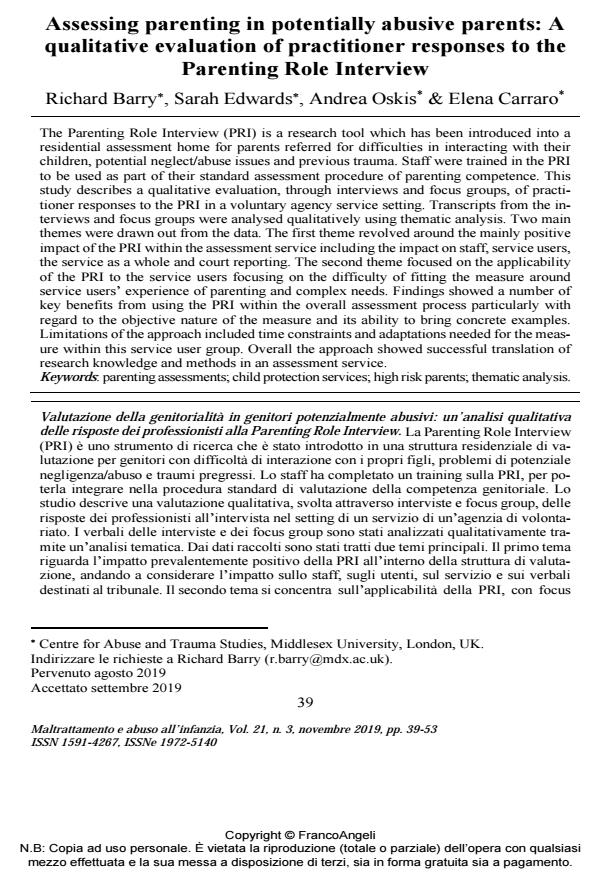Assessing parenting in potentially abusive parents: A qualitative evaluation of practitioner responses to the Parenting Role Interview
Titolo Rivista MALTRATTAMENTO E ABUSO ALL’INFANZIA
Autori/Curatori Richard Barry, Sarah Edwards, Andrea Oskis, Elena Carraro
Anno di pubblicazione 2019 Fascicolo 2019/3
Lingua Inglese Numero pagine 15 P. 39-53 Dimensione file 302 KB
DOI 10.3280/MAL2019-003004
Il DOI è il codice a barre della proprietà intellettuale: per saperne di più
clicca qui
Qui sotto puoi vedere in anteprima la prima pagina di questo articolo.
Se questo articolo ti interessa, lo puoi acquistare (e scaricare in formato pdf) seguendo le facili indicazioni per acquistare il download credit. Acquista Download Credits per scaricare questo Articolo in formato PDF

FrancoAngeli è membro della Publishers International Linking Association, Inc (PILA), associazione indipendente e non profit per facilitare (attraverso i servizi tecnologici implementati da CrossRef.org) l’accesso degli studiosi ai contenuti digitali nelle pubblicazioni professionali e scientifiche.
The Parenting Role Interview (PRI) is a research tool which has been introduced into a res-idential assessment home for parents referred for difficulties in interacting with their chil-dren, potential neglect/abuse issues and previous trauma. Staff were trained in the PRI to be used as part of their standard assessment procedure of parenting competence. This study describes a qualitative evaluation, through interviews and focus groups, of practitioner re-sponses to the PRI in a voluntary agency service setting. Transcripts from the interviews and focus groups were analysed qualitatively using thematic analysis. Two main themes were drawn out from the data. The first theme revolved around the mainly positive impact of the PRI within the assessment service including the impact on staff, service users, the service as a whole and court reporting. The second theme focused on the applicability of the PRI to the service users focusing on the difficulty of fitting the measure around service us-ers’ experience of parenting and complex needs. Findings showed a number of key benefits from using the PRI within the overall assessment process particularly with regard to the objective nature of the measure and its ability to bring concrete examples. Limitations of the approach included time constraints and adaptations needed for the measure within this ser-vice user group. Overall the approach showed successful translation of research knowledge and methods in an assessment service.
La Parenting Role Interview (PRI) è uno strumento di ricerca che è stato introdotto in una struttura residenziale di valutazione per genitori con difficoltà di interazione con i propri figli, problemi di potenziale negligenza/abuso e traumi pregressi. Lo staff ha completato un training sulla PRI, per poterla integrare nella procedura standard di valutazione della compe-tenza genitoriale. Lo studio descrive una valutazione qualitativa, svolta attraverso interviste e focus group, delle risposte dei professionisti all’intervista nel setting di un servizio di un’agenzia di volontariato. I verbali delle interviste e dei focus group sono stati analizzati qualitativamente tramite un’analisi tematica. Dai dati raccolti sono stati tratti due temi princi-pali. Il primo tema riguarda l’impatto prevalentemente positivo della PRI all’interno della struttura di valutazione, andando a considerare l’impatto sullo staff, sugli utenti, sul servizio e sui verbali destinati al tribunale. Il secondo tema si concentra sull’applicabilità della PRI, con focus sulla difficoltà di modellare lo strumento sull’esperienza di genitorialità e sui bisogni complessi degli utenti del servizio. I risultati hanno evidenziato diversi vantaggi chiave derivati dall’utilizzo della PRI all’interno del processo di valutazione globale, in particolare per quanto riguarda la natura oggettiva dell’intervista e la sua abilità di fornire esempi concreti. Tra i limiti dell’approccio sono da citare i vincoli temporali e gli adeguamenti necessari per utilizzare lo strumento sullo specifico gruppo di utenti. Complessivamente, l’approccio ha mostrato un’efficace traduzione pratica della conoscenza e del metodo di ricerca in un servizio di valuta-zione.
Parole chiave:Interviste di valutazione; trauma infantile; genitori ad alto rischio; servizi.
Richard Barry, Sarah Edwards, Andrea Oskis, Elena Carraro, Assessing parenting in potentially abusive parents: A qualitative evaluation of practitioner responses to the Parenting Role Interview in "MALTRATTAMENTO E ABUSO ALL’INFANZIA" 3/2019, pp 39-53, DOI: 10.3280/MAL2019-003004